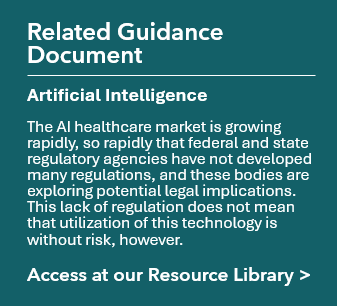Artificial intelligence (AI) is becoming a pivotal tool in human resources (HR) functions. From automating repetitive tasks to making data-driven decisions in hiring and employee management, AI holds the potential to revolutionize the way businesses operate. But the integration of AI into HR processes also raises significant legal, ethical, and practical concerns.
 The rise of AI in HR
The rise of AI in HR
AI in HR is here—now. Companies are using it to screen résumés, schedule interviews, analyze employee performance, and even predict workforce needs. The benefits are clear: AI can process large volumes of data quickly and without human error, leading to more efficient and consistent outcomes. For instance, AI can help identify the best candidates for a job by analyzing résumés and comparing them against the job description. This speeds up the hiring process while reducing the likelihood of human bias influencing the selection.
However, while AI offers these advantages, it also presents new challenges, particularly around fairness and transparency. The algorithms that power AI systems are only as good as the data used to train them; if the data contains biases—such as historical biases in hiring practices—those biases can be perpetuated and even amplified by AI, leading to discriminatory outcomes. Famously, several years ago a large technology employer tried to use AI to hire employees…and discovered it was biased in favor of their typical hires: white males.
The legal implications of AI in employment
As AI becomes more embedded in HR processes, it is important that employers understand the legal implications. As with the above-mentioned employer, one of the primary concerns is the risk of accidental discrimination. In many jurisdictions, employment laws prohibit discrimination based on race, gender, age, disability, and other characteristics. If an AI system inadvertently discriminates against a candidate or employee based on one of these characteristics, the employer could be liable.
Another legal consideration is data privacy. AI systems often require access to large amounts of personal data to function effectively. Employers must ensure that they are collecting, storing, and using this data in compliance with data protection laws, such as the General Data Protection Regulation (GDPR) in Europe or the California Consumer Privacy Act (CCPA) in the United States. Failure to do so can result in significant legal penalties and damage to the company’s reputation.
 Risk management and best practices
Risk management and best practices
Given the risks associated with AI in employment, best practices to mitigate these risks are essential. One of the most important steps is conducting regular audits of AI systems. These audits should assess whether the AI is working as intended and whether it is producing any biased or discriminatory outcomes. If issues are identified, address them promptly.
Transparency is also key. Employers should ensure that employees and candidates are aware of how AI is used in HR processes. This includes providing clear information about what data is collected, how it is used, and how decisions are made. Transparency not only helps build trust, but also allows individuals to challenge decisions they believe are unfair.
Another best practice is to maintain human oversight of AI systems. While AI can automate many tasks, it should not be relied upon exclusively, especially for decisions that have significant impacts on people’s lives, such as hiring or firing. Human HR professionals should always have the final say in these decisions, with AI serving as a tool to inform, rather than replace, human judgment.
Employers should also invest in training for HR professionals on how to use AI tools effectively and ethically. This includes understanding the limitations of AI, recognizing potential biases, and knowing how to interpret AI-generated insights. By equipping HR professionals with the knowledge and skills they need, employers can ensure that AI is used responsibly.
Ethical considerations
In addition to legal risks, important ethical considerations surround the use of AI in employment. One of the primary concerns is the potential for AI to infringe on employee privacy. AI systems can collect and analyze vast amounts of data about employees, from their performance metrics to their online behavior. While this data can be useful for managing the workforce, it also raises questions about where the line should be drawn between legitimate business interests and employee privacy rights.
Another issue is the lack of transparency in AI decision-making. AI systems, particularly those that use machine learning, can be complex and opaque, making it difficult to understand how they arrive at certain decisions. This “black box” nature of AI can lead to a lack of accountability, as it may not be clear who is responsible if the AI makes a mistake. Employers must ensure that AI systems are designed and used in a way that is transparent, and that there is a clear line of accountability for AI-driven decisions.
Case studies and examples
Following are some examples of the potential benefits and pitfalls of AI in HR:
- A large corporation used AI to streamline its hiring process by screening résumés and scheduling interviews. The AI system quickly identified the most qualified candidates, reducing the time to hire by 50 percent. However, an audit revealed that the AI was inadvertently favoring candidates from certain universities. The company addressed this issue by re-training the AI on more diverse data.
- A company deployed AI to watch employee productivity and provide real-time feedback. While the tool helped managers identify high-performing employees and areas for improvement, it also raised concerns about employee privacy. Some employees felt that the constant monitoring was intrusive and stressful. The company responded by adjusting the AI’s parameters to focus on overall team performance rather than individual monitoring, and ensuring that employees were informed about how the AI was being used.
The future is here
The use of AI in employment is likely to expand, with new applications emerging in areas such as predictive analytics and employee engagement. But as AI becomes more pervasive, the challenges associated with it will also grow. Employers must remain vigilant in managing the legal, ethical, and practical risks that come with AI, ensuring that it is used in a way that is fair, transparent, and respectful of employees.
AI holds great promise for transforming HR processes. But employers must balance the benefits of efficiency and data-driven insights with the need to protect against discrimination, ensure transparency, and uphold ethical standards. With careful implementation and ongoing oversight, AI can be a valuable tool for creating a more effective and equitable workplace.
ABOUT THE AUTHOR
Justin Steiner’s practice is dedicated to employment law and healthcare litigation, in addition to general civil litigation. He defends healthcare providers, clinics, hospitals, and academic medical centers against claims of medical malpractice and corporate negligence. Justin also routinely defends healthcare providers and clinics in malpractice and licensing proceedings before administrative agencies. He also handles complex pharmaceutical and medical device litigation.